But what was there to say? Only that there were tears. Only that Quietness and Emptiness fitted together like stacked spoons. Only that there was a snuffling in the hollows at the base of a lovely throat. Only that a hard honey-colored shoulder had a semicircle of teethmarks on it. Only that they held each other close, long after it was over. Only that what they shared that night was not happiness, but hideous grief. Only that once again they broke the Love Laws. That lay down who should be loved. And how. And how much. .Arundhati Roy
To love. To be loved. To never forget your own insignificance. To never get used to the unspeakable violence and the vulgar disparity of life around you. To seek joy in the saddest places. To pursue beauty to its lair. To never simplify what is complicated or complicate what is simple. To respect strength, never power. Above all, to watch. To try and understand. To never look away. And never, never to forget.Arundhati Roy
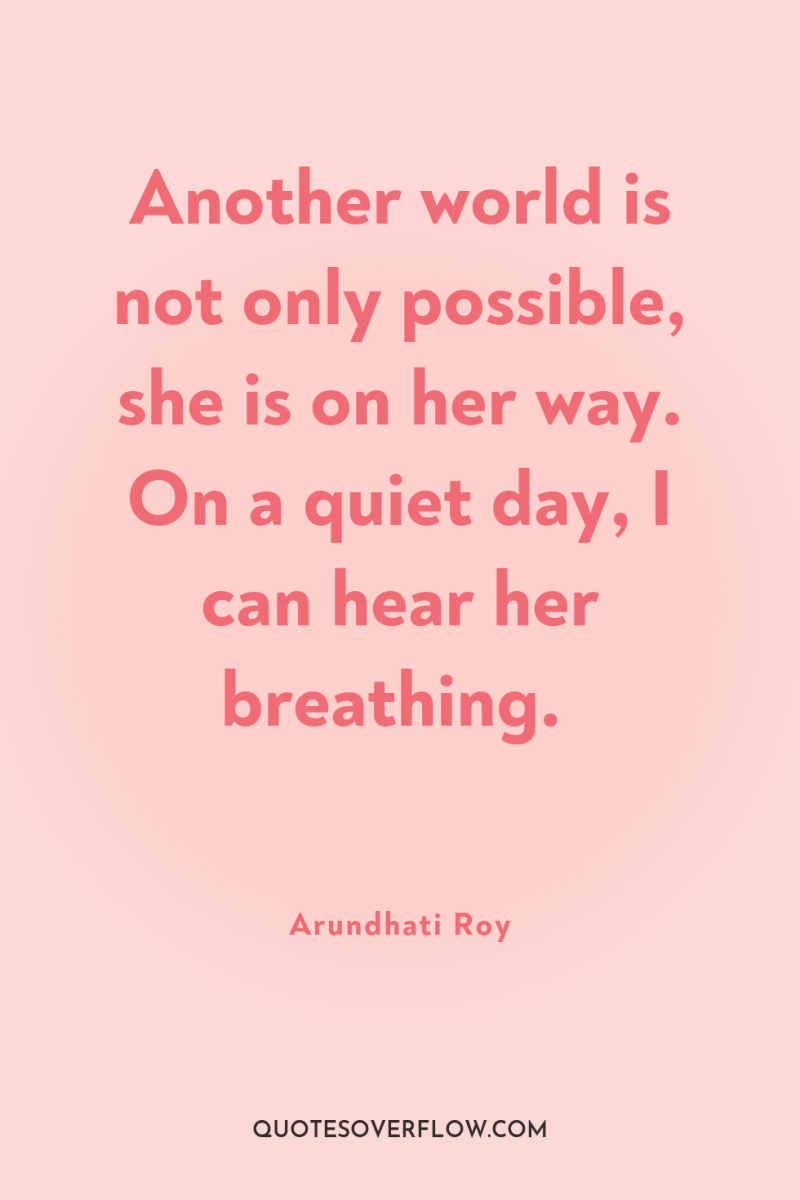
Another world is not only possible, she is on her way. On a quiet day, I can hear her breathing.Arundhati Roy
It is after all so easy to shatter a story. To break a chain of thought. To ruin a fragment of a dream being carried around carefully like a piece of porcelain. To let it be, to travel with it, as Velutha did, is much the harder thing to do.Arundhati Roy
At times there's something so precise and mathematically chilling about nationalism. Build a dam to take away water AWAY from 40 million people. Build a dam to pretend to BRING water to 40 million people. Who are these gods that govern us? Is there no limit to their powers?Arundhati Roy
It is such a supreme folly to believe that nuclear weapons are deadly only if they're used. The fact that they exist at all, their presence in our lives, will wreak more havoc than we can begin to fathom. Nuclear weapons pervade our thinking. Control our behavior. Administer our societies. Inform our dreams. They bury themselves like meat hooks deep in the base of our brains. They are purveyors of madness. They are the ultimate colonizer. Whiter than any white man that ever lived. The very heart of whiteness.Arundhati Roy
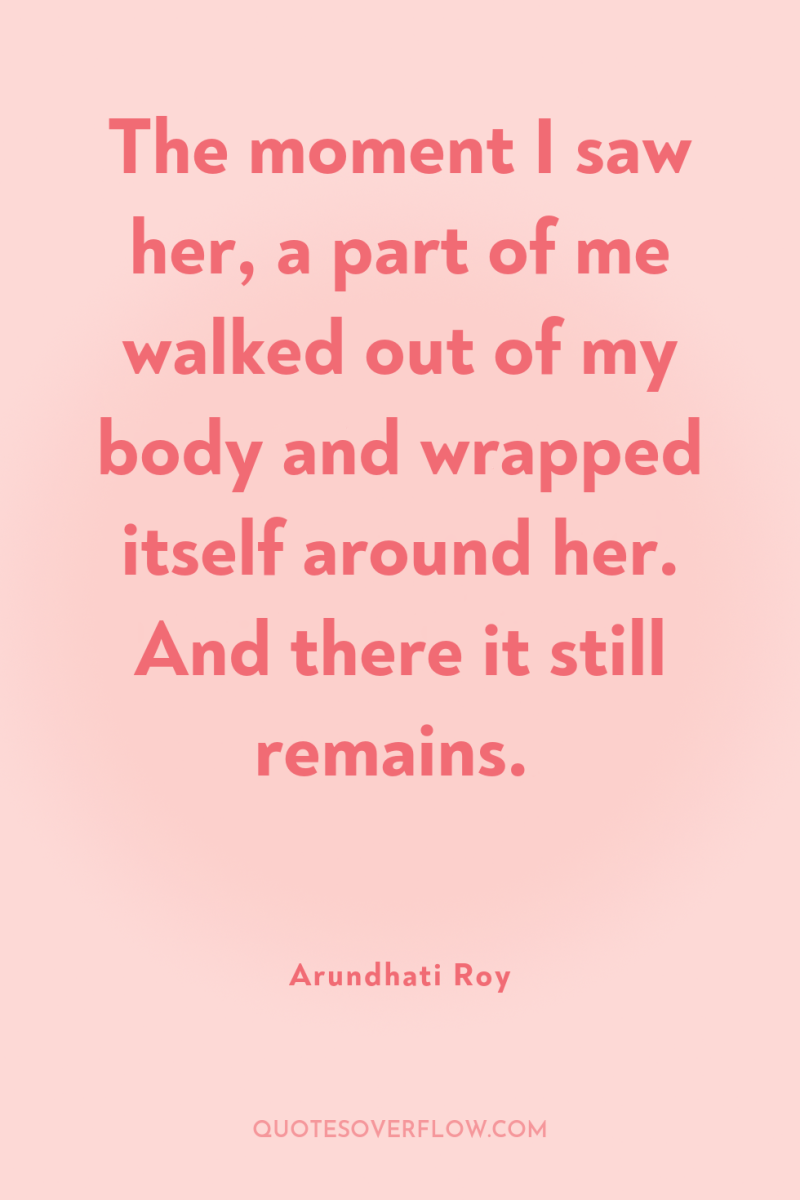
The moment I saw her, a part of me walked out of my body and wrapped itself around her. And there it still remains.Arundhati Roy
Our strategy should be not only to confront empire, but to lay siege to it. To deprive it of oxygen. To shame it. To mock it. With our art, our music, our literature, our stubbornness, our joy, our brilliance, our sheer relentlessness — and our ability to tell our own stories. Stories that are different from the ones we’re being brainwashed to believe. The corporate revolution will collapse if we refuse to buy what they are selling — their ideas, their version of history, their wars, their weapons, their notion of inevitability. Remember this: We be many and they be few. They need us more than we need them. Another world is not only possible, she is on her way. On a quiet day, I can hear her breathing.Arundhati Roy
Something about Tilo’s new home reminded Musa of the story of Mumtaz Afzal Malik, the young taxi driver whom Amrik Singh had killed, whose body had been recovered from a field and delivered to his family with earth in his clenched fists and mustard ï¬â€šowers growing through his fingers. That story had always stayed with Musa — perhaps because of the way hope and grief were woven together in it, so tightly, so inextricably.Arundhati Roy
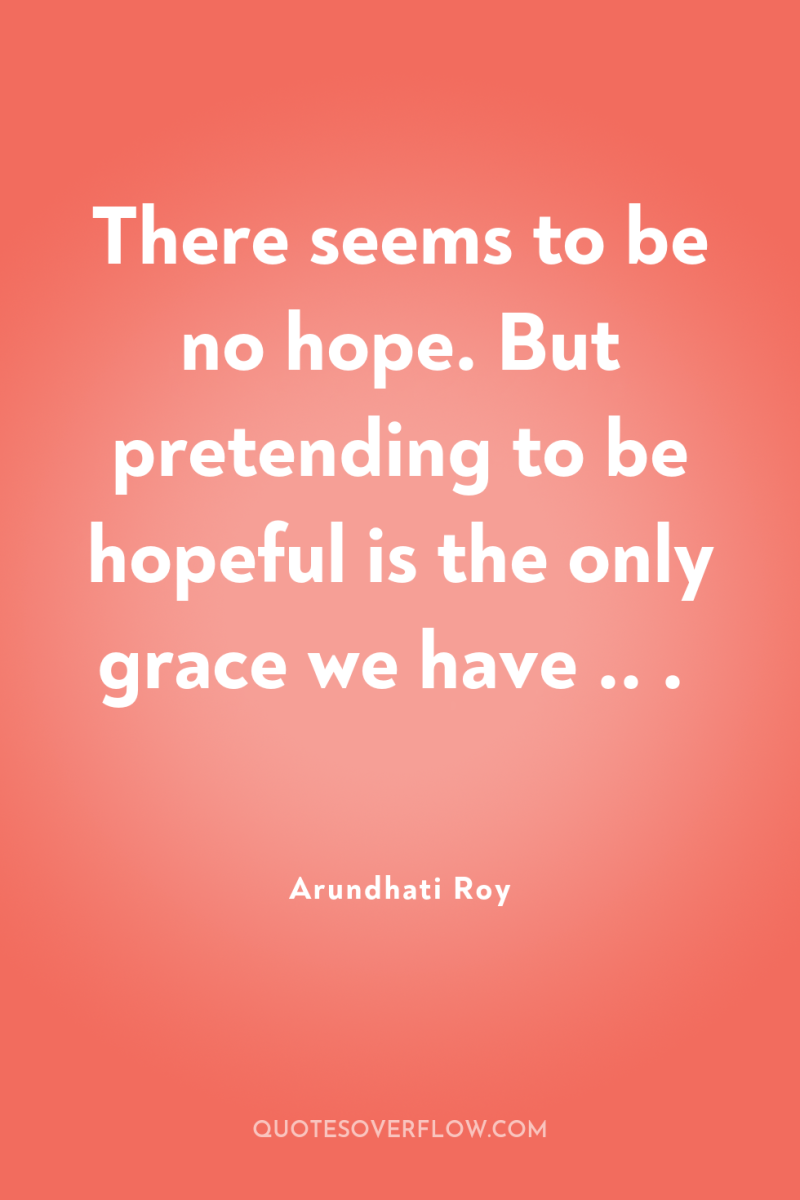
There seems to be no hope. But pretending to be hopeful is the only grace we have .. .Arundhati Roy
The steel door of the incinerator went up and the muted hum of the eternal fire became a red roaring. The heat lunged out at them like a famished beast. Then Rahel's Ammu was fed to it. Her hair, her skin, her smile. Her voice. They way she used Kipling to love her children before putting them to bed: We be of one blood, though and I. Her goodnight kiss. The way she held their faces steady with one hand (squashed-cheeked, fish-mouthed) while she parted and combed their hair with the other. The way she held knickers out for Rahel to climb into. Left leg, right leg. All this was fed to the beast, and it was satisfied. She was their Ammu and their Baba and she had loved them Double.Arundhati Roy
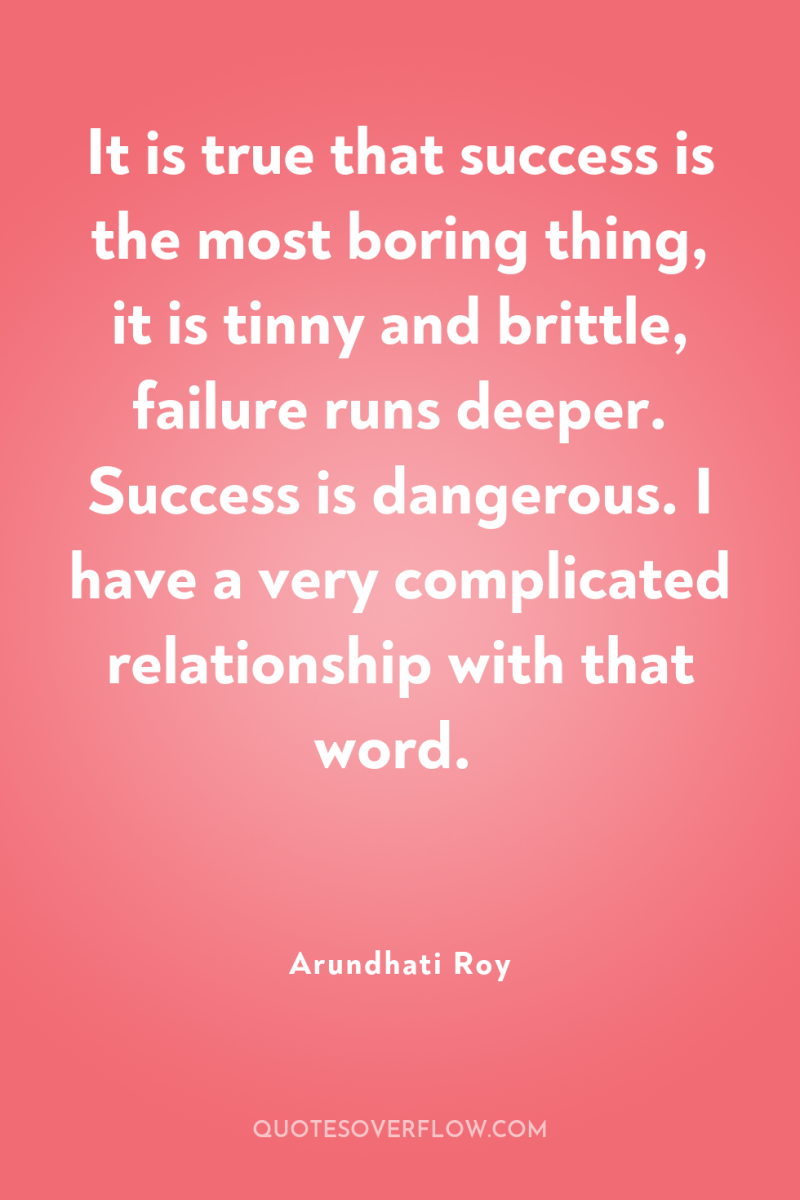
It is true that success is the most boring thing, it is tinny and brittle, failure runs deeper. Success is dangerous. I have a very complicated relationship with that word.Arundhati Roy
They visited him in saris, clumping gracelessly through red mud and long grass .. and introduced themselves as Mrs. Pillai, Mrs. Eapen and Mrs. Rajagopalan. Velutha introduced himself and his paralyzed brother Kuttappen (although he was fast asleep). He greeted them with the utmost courtesy. He addressed them all as Kochamma [an honorific title for a woman] and gave them fresh coconut water to drink. He chatted to them about the weather. The river. The fact that in his opinion coconut trees were getting shorter by the year. As were the ladies in Ayemenem. He introduced them to his surly hen. He showed them his carpentry tools, and whittled them each a little wooden spoon. It is only now, these years later, that Rahel with adult hindsight recognized the sweetness of that gesture. A grown man entertaining three raccoons, treating them like real ladies. Instinctively colluding in the conspiracy of their fiction, taking care not to decimate it with adult carelessness. Or affection. [emphasis mine] It is after all so easy to shatter a story. To break a chain of thought. To ruin a fragment of a dream being carried around carefully like a piece of porcelain. To let it be, to travel with it, as Velutha did, is much the harder thing to do. .Arundhati Roy

Her collarbones like wings that spread from the base of her throat to the ends of her shoulders. A bird held down by skin.Arundhati Roy
Have we raised the threshold of horror so high that nothing short of a nuclear strike qualifies as a 'real' war? Are we to spend the rest of our lives in this state of high alert with guns pointed at each other's heads and fingers trembling on the trigger?Arundhati Roy
But when they made love he was offended by her eyes. They behaved as though they belonged to someone else. Someone watching. Looking out of the window at the sea. At a boat in the river. Or a passerby in the mist inArundhati Roy
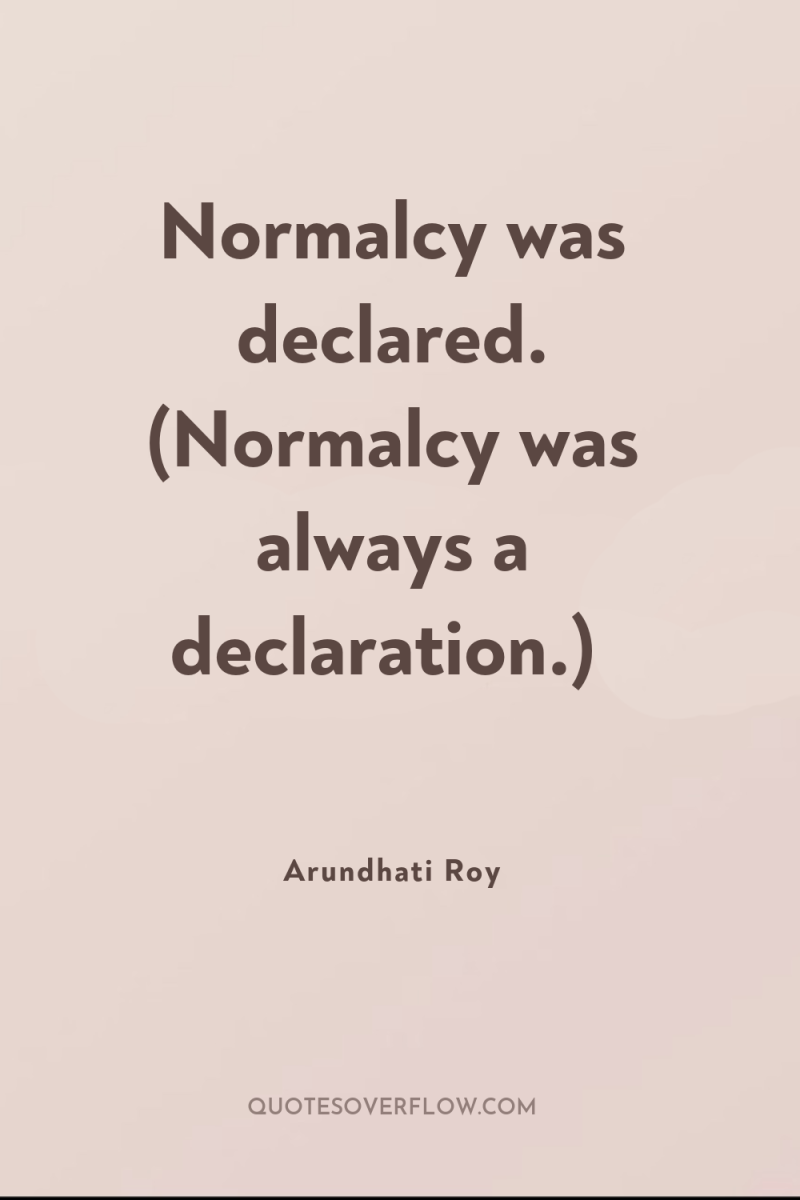
Normalcy was declared. (Normalcy was always a declaration.)Arundhati Roy
It turned out to be a war which, unfortunately for Comrade Pillai, would end almost before it began. Victory was gifted to him wrapped and beribboned, on a silver tray. Only then, when it was too late, and Paradise Pickles slumped softly to the floor without so much as a murmur or even the pretense of resistance, did Comrade Pillai realize that what he really needed was the process of war more than the outcome of victory. War could have been the stallion that he rode, part of, if not all, the way to the Legislative Assembly, whereas victory left him no better off than when he started out. He broke the eggs but burned the omelette.Arundhati Roy
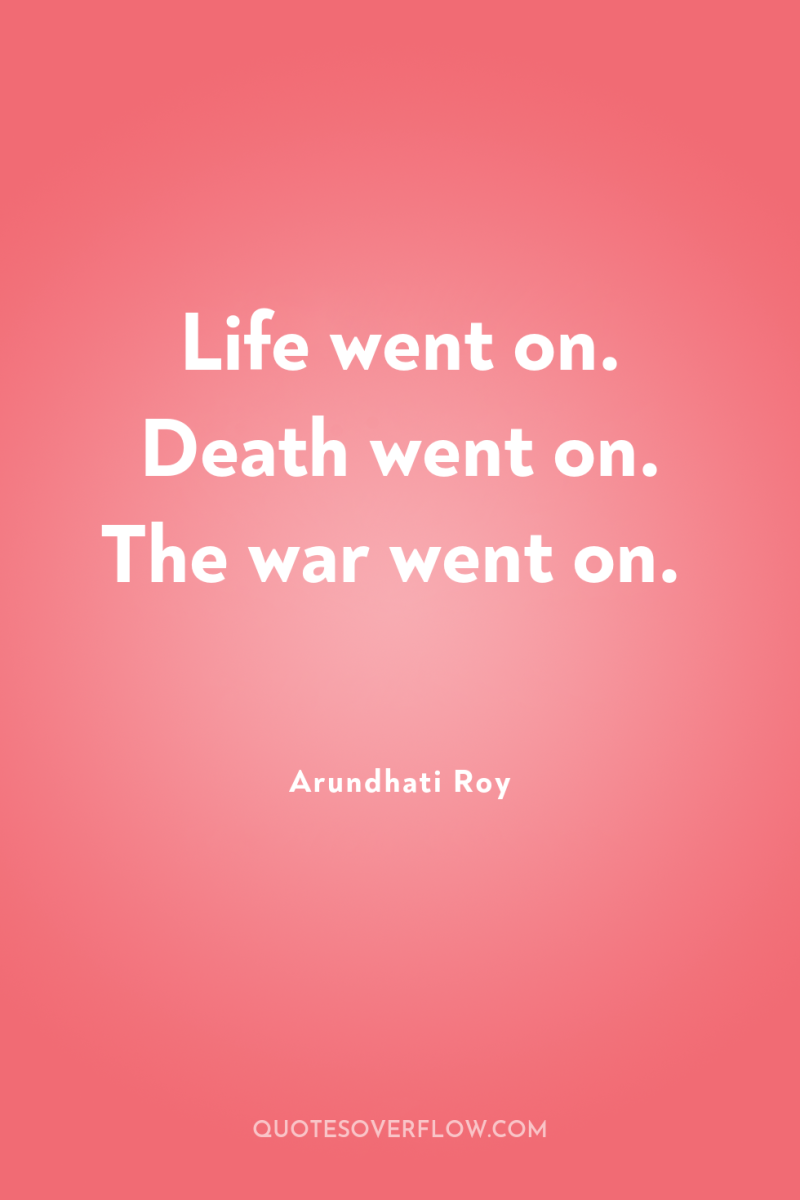
Life went on. Death went on. The war went on.Arundhati Roy
We're told, often enough, that as a species we are poised on the edge of the abyss. It's possible that our puffed-up, prideful intelligence has outstripped our instinct for survival and the road back to safety has already been washed away. In which case there's nothing much to be done. If there is something to be done, then one thing is for sure: those who created the problem will not be the ones who come up with a solution. .Arundhati Roy
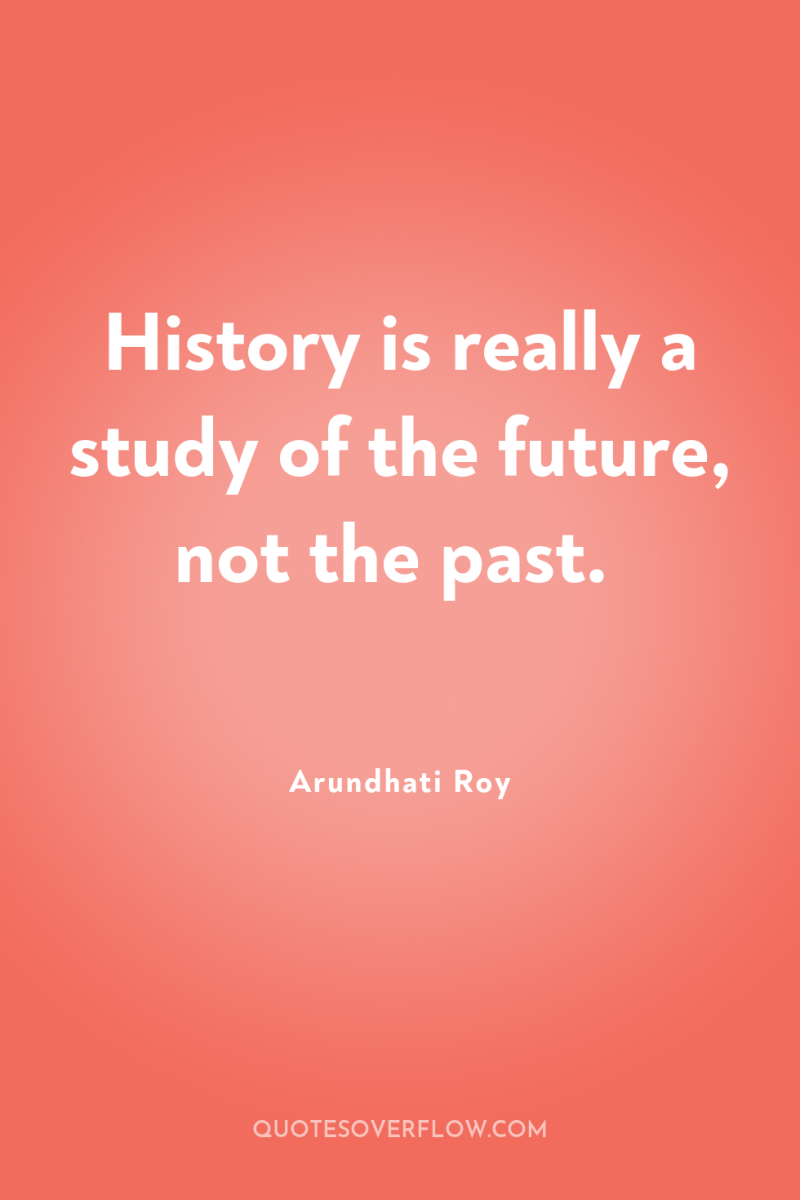
History is really a study of the future, not the past.Arundhati Roy
They sensed somehow that she lived in the prenumbral shadows between two worlds, just beyond the grasp of their power. That a woman that they had already damned, now had little left to lose, and could therefore be dangerous. So on the days that the radio played Ammu's songs, people avoided her, making little loops around her, because everybody agreed that it was best to just Let Her Be.Arundhati Roy
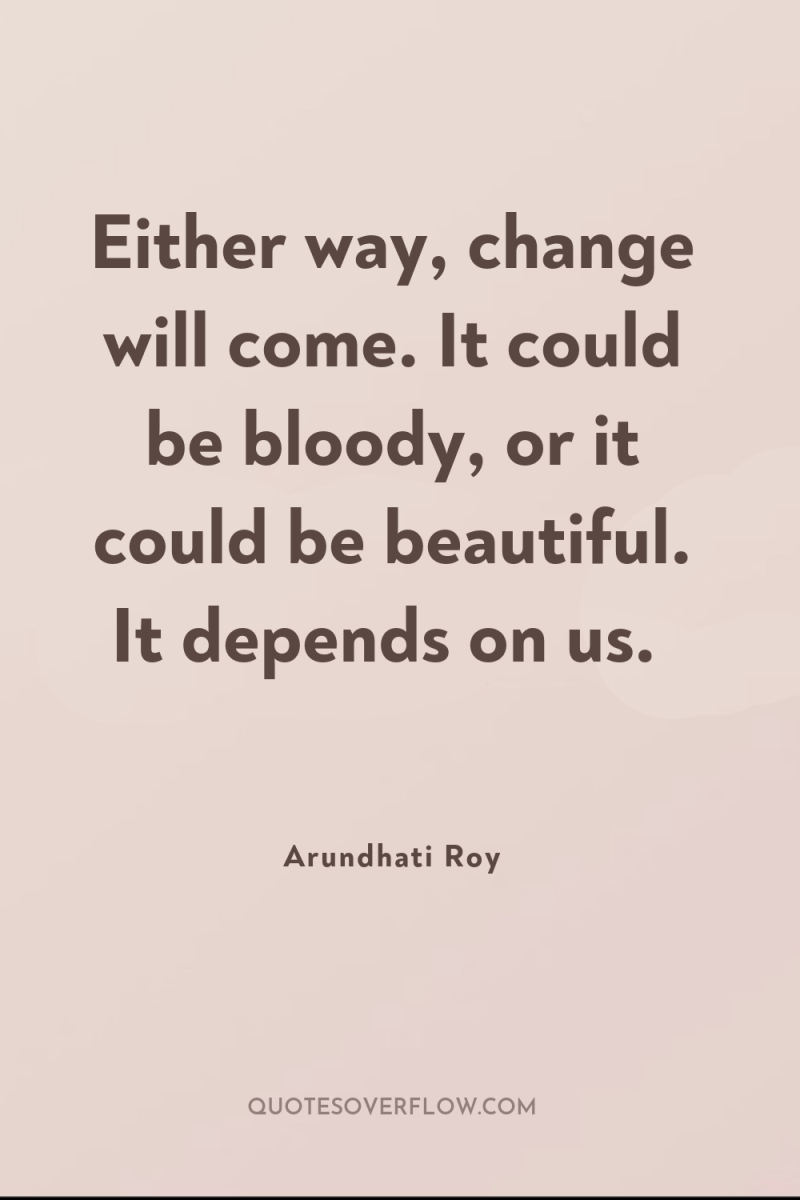
Either way, change will come. It could be bloody, or it could be beautiful. It depends on us.Arundhati Roy
She discovered that underneath the aspect of the Rumpled Porcupine, a tortured Marxist was at war with an impossible, incurable Romantic - who forgot the candles, who broke the wine glasses, who forgot the ring. Who made love to her with a passion that took her breath away. She had always thought of herself as a somewhat uninteresting, thick-waisted, thick ankled girl. Not bad-looking. Not special. But when she was with Chacko, old limits were pushed back. Horizons expanded. She had never before met a man who spoke of the workd - of what it was, and how it came to be, or what he thought would become of it - in the way in which other men she knew discussed their jobs, their friends or their weekends at the beach. Being with Chacko made Margaret Kochamma feel as though her soul had escaped from the narrow confines of her island country, into the vast extravagant spaces of his. He made her feel as though the world belonged to them - as though it lay before thm like an opened frog on a dissecting table, begging to be examined. .Arundhati Roy
To understand history, ' Chacko said, 'we have to go inside and listen to what they're saying. And look at the books and the pictures on the wall. And smell the smells.Arundhati Roy
History would be a revelation of the future as much as it was a study of the past.Arundhati Roy
How history negotiates its terms and collects its dues from those who break its laws.Arundhati Roy
Certainly no beast has essayed the boundless, infinitely inventive art of human hatred. No beast can match its range and power.Arundhati Roy
When she listened to songs that she loved on the radio, something stirred inside her. A liquid ache spread under her skin, and she walked out of the world like a witch.Arundhati Roy
This was the trouble with families. Like invidious doctors, they knew just where it hurt.Arundhati Roy
People often don't understand the engine that drives corruption. Particularly in India, they assume government equals corruption, private companies equal efficiency. But government officials are not genetically programmed to be corrupt. Corruption is linked to power. If it is the corporations that are powerful, then they will be corrupt.Arundhati Roy
Isn't there a flaw in the logic of that phrase - speak truth to power? It assumes that power doesn't know the truth. But power knows the truth just as well, if not better, than the powerless know the truth. Enron knows what it's doing. We don't have to tell it what it's doing. We have to tell other people what Enron is doing. Similarly, the people who are building the dams know what they're doing. The contractors know how much they're stealing. The bureaucrats know how much they're getting in bribes. Power knows the truth. There isn't any doubt about that. It is really about telling the story. Good fiction is the truest thing that ever there was. Facts are not necessarily the only truths. Facts can be fiddled with by economists and bankers. There are other kinds of truth. It's about telling the story. As a writer, that's the best thing I can do. It's not just about digging up facts.Arundhati Roy
Enemies can't break your spirit, only friends can.Arundhati Roy
Who can know from the word goodbye what kind of parting is in store for us.Arundhati Roy
Even in the most uneventful of our lives, we are called upon to choose our battles...Arundhati Roy
Normality in our part of the world is a bit like a boiled egg: its humdrum surface conceals at its heart a yolk of egregious violence. It is our constant anxiety about that violence, our memory of its past labours and our dread of its future manifestations, that lays down the rules for how a people as complex and as diverse as we continue to coexist — continue to live together, tolerate each other and, from time to time, murder one another. As long as the centre holds, as long as the yolk doesn’t run, we’ll be fine. In moments of crisis it helps to take the long view. .Arundhati Roy
Still the Amaltas bloomed, a brilliant, defiant yellow. Each blazing summer it reached up and whispered to the hot brown sky, Fuck You.Arundhati Roy
Fiction and non-fiction are only different techniques of story telling. For reasons I do not fully understand, fiction dances out of me. Non-fiction is wrenched out by the aching, broken world I wake up to every morning.Arundhati Roy
At least not until the Terror took hold of him. Not until he saw, night after night, a little boat being rowed across the river. Not until he saw it return at dawn. Not until he saw what his Untouchable son had touched. More than touched. Enter. Loved.Arundhati Roy
The twins were too young to know that these were only history’s henchmen. Sent to square the books and collect the dues from those who broke its laws. Impelled by feelings that were primal yet paradoxically wholly impersonal. Feelings of contempt born of inchoate, unacknowledged fear–civilization’s fear of nature, men’s fear of women, power’s fear of powerlessness. Man’s subliminal urge to destroy what he could neither subdue nor deify.Arundhati Roy
The only dream worth having, I told her, is to dream that you will live while you're alive and die only when you're dead.Arundhati Roy
From now on it is not dying we must fear, but living.Arundhati Roy
It wasn't what lay at the end of her road that frightened Ammu as much as the nature of the road itself. No milestones marked its progress. No trees grew along it. No dappled shadows shaded it. No mists rolled over it. No birds circled it. No twists, no turns or hairpin bends obscured even momentarily, her clear view of the end. This filled Ammu with an awful dread, because she was not the kind of woman who wanted her future told. She dreaded it too much. So if she were granted one small wish perhaps it would have been Not to Know, Not to know what each day had in store for her. Not to know where she might be, next month, next year. Ten years on. Not to know which way her road might turn and what lay beyond the bend. .Arundhati Roy
But can we, should we, let apprehensions about the future immobilize us in the present?Arundhati Roy
In a determined reversal of her inherent nature, Kochu Maria now, as a policy, hardly ever believed anything that anybody said.Arundhati Roy
That's what careless words do. They make people love you a little less.Arundhati Roy
We ought not to speak only about the economics of globalization, but about the psychology of globalization. It's like the psychology of a battered woman being faced with her husband again and being asked to trust him again. That's what is happening. We are being asked by the countries that invented nuclear weapons and chemical weapons and apartheid and modern slavery and racism - countries that have perfected the gentle art of genocide, that colonized other people for centuries - to trust them when they say that they believe in a level playing field and the equitable distribution of resources and in a better world. It seems comical that we should even consider that they really mean what they say.Arundhati Roy
Trees raised their naked, mottled branches to the sky like mourners stilled in attitudes of grief.Arundhati Roy
Only that once again they broke the Love Laws. That lay down who should be loved. And how. And how much.Arundhati Roy
To fuel yet another war this time against Iraq by cynically manipulating people's grief, by packaging it for TVspecials sponsored by corporations selling detergent and running shoes, is to cheapen and devalue grief, to drain itof meaning. What we are seeing now is a vulgar display of the business of grief, the commerce of grief, the pillagingof even the most private human feelings for political purpose. It is a terrible, violent thing for a State to do to itspeople.Arundhati Roy
Flat muscled and honey coloured. Sea secrets in his eyes. A silver raindrop in his ear.Arundhati Roy
To call someone 'anti-American', indeed, to be anti- American, (or for that matter anti- Indian, or anti- Timbuktuan) is not just racist, it's a failure of the imagination. An inability to see the world in terms other than those that the establishment has set out for you: If you're not a Bushie you're a Taliban. If you don't love us, you hate us. If you're not Good you're Evil. If you're not with us, you're with the terrorists.Arundhati Roy
Ridges of muscle on his stomach rose under his skin like divisions on a slab of chocolate. He held her close by the light of an oil lamp, and he shone as though he had been polished with a high-wax body polish.Arundhati Roy
The two men had a conversation. Brief, cryptic, to the point. As though they had exchanged numbers and not words. No explanations seemed necessary. They were not friends, Comrade Pillai and Inspector Thomas Mathew, and they didn’t trust each other. But they understood each other perfectly. They were both men whom childhood had abandoned without a trace. Men without curiosity. Without doubt. Both in their own way truly, terrifyingly adult. They looked out at the world and never wondered how it worked, because they knew. They worked it. They were mechanics who serviced different parts of the machine. .Arundhati Roy
There are things that can be forgotten. And things that cannot - that sit on dusty shelves like stuffed birds with baleful, sideways staring eyes.Arundhati Roy
Perhaps it’s true that things can change in a day. That a few dozen hours can affect the outcome of whole lifetimes. And that when they do, those few dozen hours, like the salvaged remains of a burned house–the charred clock, the singed photograph, the scorched furniture–must be resurrected from the ruins and examined. Preserved. Accounted for. Little events, ordinary things, smashed and reconstituted. Imbued with new meaning. Suddenly they become the bleached bones of a story.Arundhati Roy
She was perhaps too young to realize that what she assumed was her love for [him] was actually a tentative, timorous, acceptance of herself.Arundhati Roy
I see a role for specialized knowledge, but I think that it's important for there to be an arena where it is shared, where it is communicated. It's not that somebody shouldn't have specialized knowledge. The ability to dig a trench and lay a cable is a kind of specialized knowledge. Farmers have specialized knowledge, too. The question is: what sort of knowledge is privileged in our societies? I don't think that a CEO is more valuable to society and ought to be paid ten million dollars a year, while farmers and laborers starve. The range of what is valued has become so extreme that one lot of people have captured it and left three-quarters of the world to live in unthinkable poverty, because their work is not valued. What would happen if the sweepers of the city went on strike or the sewage system didn't work? A CEO wouldn't be able to deal with his own shit. .Arundhati Roy
Glanced up and caught Ammu's gaze. Centuries telescoped into one evanescent moment. History was wrong-footed, caught off guard. Sloughed off like an old snakeskin. Its marks , its scars its wouns from old wars and the walking backwards days all fell away. In its abscence it left an aura, a palpable shimmering that was as plain as water in a river or the sun in the sky. As plain to feel the heat on a hot day, or the tug of a fish on a taut line. So obvious that no-one noticed. In that brief moment, Velutha looked up and saw things that he hadn't seen before. Things that had been out of bounds so far, obscured by histor's blinkers.. This knowing slid into him cleanly, like the sharp edge of a knife. Cold and hot at once. It only took a moment. Ammu saw that he saw. She looked away. He did too. History's fiends returned to claim them. To rewrap them in its old scarred pelt and drag them back to where they really lived. Where the Love Laws lay down who should be loved. And how. And how much.Arundhati Roy
In India we're fighting to retain a wilderness that we have. Whereas in the west, it's gone. Every person that's walking down the street is a walking bar code. You can tell where their clothes are from, how much they cost, which designer made which shoe, which shop you bought each item from. Everything is civilized and tagged and valued and numbered and put in it's place. Whereas in India, the wilderness still exists-the unindoctrinated wilderness of the mind, full of untold secrets and wild imaginings.Arundhati Roy
Suddenly Ammu hoped that it had been him that Rahel saw him in the march. She hoped it had been him that raised his flag and knotted arm in anger. She hoped that under his careful cloak of cheerfulness he housed a living breathing anger against the smug, ordered world that she raged against.Arundhati Roy
NGOs have a complicated space in neoliberal politics. They are supposed to mop up the anger. Even when they are doing good work, they are supposed to maintain the status quo. They are the missionaries of the corporate world.Arundhati Roy
Sitting next to Tilo, breathing next to her, he felt like an empty house whose locked windows and doors were creaking open a little, to air the ghosts trapped inside it.Arundhati Roy
She wore flowers in her hair and carried magic secrets in her eyes. She spoke to no one. She spent hours on the riverbank. She smoked cigarettes and had midnight swims...Arundhati Roy
[Internationa] Aid is just another praetorian business enterprise.Arundhati Roy
Cow, goat, chicken, lamb .. . only slaves eat like this, ’ Musa said, heaping an impolite amount on to his plate. ‘Our stomachs are graveyards.Arundhati Roy
There's really no such thing as the 'voiceless'. There are only the deliberately silenced, or the preferably unheard.Arundhati Roy
Power is fortified not just by what it destroys, but also by what it creates. Not just by what it takes, but also by what it gives. And powerlessness reaffirmed not just by the helplessness of those who have lost, but also by the gratitude of those who have (or THINK they have) gained.Arundhati Roy
They only asked for punishments that fitted their crimes. Not ones that came like cupboards with built-in bedrooms. Not ones you spent your whole life in, wandering through its maze of shelves.Arundhati Roy
His gratitude widened his smile and bent his back.Arundhati Roy
Socrates asked the key question: why should we be moral?Arundhati Roy
The story ï¬â€šared, then faded.Arundhati Roy
When, as happened recently in France, an attempt is made to coerce women out of the burqa rather than creating a situation in which a woman can choose what she wishes to do, it’s not about liberating her, but about unclothing her. It becomes an act of humiliation and cultural imperialism. It’s not about the burqa. It’s about the coercion. Coercing a woman out of a burqa is as bad as coercing her into one. Viewing gender in this way, shorn of social, political and economic context, makes it an issue of identity, a battle of props and costumes. It is what allowed the US government to use western feminist groups as moral cover when it invaded Afghanistan in 2001. Afghan women were (and are) in terrible trouble under the Taliban. But dropping daisy-cutters on them was not going to solve their problems.Arundhati Roy
When you live in the United States, with the roar of the free market, the roar of this huge military power, the roar of being at the heart of empire, it's hard to hear the whispering of the rest of the world. And I think many US citizens want to. I don't think that all of them necessarily are co-conspirators in this concept of empire. And those who are not, need to listen to other stories in the world - other voices, other people. .Arundhati Roy
We hear all this talk about integrating the world economically, but there is an argument to be made for not integrating the world economically. Because what is corporate globalization? It isn't as if the entire world is intermeshed with each other. It's not like India and Thailand or India and Korea or India and Turkey are connected. It's more like America is the hub of this huge cultural and economic airline system. It's the nodal point. Everyone has to be connected through America, and to some extent Europe.When powers at the hub of the global economy decide that you have to be X or Y, then if you're part of that network, you have to do it. You don't have the independence of being nonaligned in some way, politically or culturally or economically. If America goes down, then everybody goes down. If tomorrow the United States decides that it wants these call center jobs back, then overnight this billion-dollar industry will collapse in India. It's important for countries to develop a certain degree of economic self-sufficiency. Just in a theoretical sense, it's important for everybody not to have their arms wrapped around each other or their fingers wrapped around each others' throats at all times, in all kinds of ways.Arundhati Roy
The policies the US government is following are dangerous for its citizens. It's true that you can bomb or buy out anybody that you want to, but you can't control the rage that's building in the world. You just can't. And that rage will express itself in some way or the other. Condemning violence when a section of your economy is based on selling weapons and making bombs and piling up chemical and biological weapons? When the soul of your culture worships violence? On what grounds are you going to condemn terrorism, unless you change your attitude toward violence? .Arundhati Roy
Then to give the kids a historical perspective, Chacko told them about the earth woman. He made them imagine that the earth - 4600 million years old - was a 46 year old woman- as old as Aleyamma teaacher, who gave them Malayalam lessons. It had taken the whole of earth woman’s life for the earth to become what it was. For the oceans to part. For the mountains to rise. The earth woman was 11 yrs old when the first single celled organisms appeared. The first animals, creatures like worms and jellyfish, appeared only when she was forty. She was over forty five - just 8 months ago - when dinosaurs roamed the earth. The whole of human civilization as we know it, began only 2 hrs ago in the earth woman’s life… .Arundhati Roy
It isn't a coincidence that the massacre of Muslims in Gujarat happened after September 11. Gujarat is also one place where the toxic waste of the World Trade Center is being dumped right now. This waste is being dumped in Gujarat, and then taken of to Ludhiana and places like that to be recycled. I think it's quite a metaphor. The demonization of Muslims has also been given legitimacy by the world's superpower, by the emperor himself. We are at a stage where democracy - this corrupted, scandalous version of democracy - is the problem. So much of what politicians do is with an eye on elections. Wars are fought as election campaigns. In India, Muslims are killed as part of election campaigns. In 1984, after the massacre of Sikhs in Delhi, the Congress Party won, hands down. We must ask ourselves very serious questions about this particular brand of democracy.Arundhati Roy
I think it is dangerous to confuse the idea of democracy with elections. Just because you have elections doesn't mean you're a democratic country. They're a very vitally important part of a democracy. But there are other things that ought to function as checks and balances. If elections are the only thing that matter, then people are going to resort to anything to win that election.Arundhati Roy
Any government's condemnation of terrorism is only credible if it shows itself to be responsive to persistent, reasonable, closely argued, non-violent dissent. And yet, what's happening is just the opposite. The world over, non-violent resistance movements are being crushed and broken. If we do not respect and honour them, by default we privilege those who turn to violent means.Arundhati Roy
Somewhere along the way, Capitalism reduced the idea of justice to mean just "human rights, " and the idea of dreaming of equality became blasphemous. We are not fighting to tinker with reforming a system that needs to be replaced.Arundhati Roy
Do we need weapons to fight wars? Or do we need wars to create markets for weapons?Arundhati Roy
Capitalism is destroying the planet. The two old tricks that dug it out of past crises-- War and Shopping--simply will not work.Arundhati Roy
How can you measure progress if you don't know what it costs and who has paid for it? How can the "market" put a price on things - food, clothes, electricity, running water - when it doesn't take into account the REAL cost of production?Arundhati Roy
They looked at each other. They weren't thinking anymore. The time for that had come and gone. Smashed smiles lay ahead of them. But that would be later. Lay Ter.Arundhati Roy
He could do only one thing at a time. If he held her, he couldn't kiss her. If he kissed her, he couldn't see her. If he saw her, he couldn't feel her.Arundhati Roy
The war for the Narmada valley is not just some exotic tribal war, or a remote rural war or even an exclusively Indian war. Its a war for the rivers and the mountains and the forests of the world. All sorts of warriors from all over the world, anyone who wishes to enlist, will be honored and welcomed. Every kind of warrior will be needed. Doctors, lawyers, teachers, judges, journalists, students, sportsmen, painters, actors, singers, lovers . The borders are open, folks! Come on in. .Arundhati Roy
But Tilo had crept up on him, and become a kind of compulsion, an addiction almost. Addiction has its own mnemonics — skin, smell, the length of the loved one’s fingers. In Tilo’s case it was the slant of her eyes, the shape of her mouth, the almost Âinvisible scar that slightly altered the symmetry of her lips and made her look defiant even when she did not mean to, the way her nostrils flared, announcing her displeasure even before her eyes did. The way she held her shoulders. The way she sat on the pot stark naked and smoked cigarettes. So many years of marriage, the fact that she was not young any more — and did nothing to pretend otherwise — didn’t change the way he felt. Because it had to do with more than all that. It was the haughtiness (despite the question mark over her ‘stock’, as his mother had not hesitated to put it). It had to do with the way she lived, in the country of her own skin. A country that issued no visas and seemed to have no consulates. .Arundhati Roy
If you're happy in a dream, does that count?Arundhati Roy
The English-language press in India supports the project of corporate globalization fully. It has no time for dispossession and drought and farmers' debts, the ravages that the corporate globalization project is wreaking on the poor of India. So to suddenly turn around and condemn the riots is a typical middle-class response. Let's support everything that leads to the conditions in which the massacre takes place, but when the killing starts, you recoil in middle-class horror, and say, "Oh, that's not very nice. Can't we be more civilized? .Arundhati Roy
If you think of the world as a global village, a fight between India and Pakistan is like a fight between the poorest people in the poorest quarters - the Adivasis and the Dalits. And in the meantime, the zamindars are laying the oil pipelines and selling both parties weapons.Arundhati Roy
Heaven opened and the water hammered down, reviving the reluctant old well, greenmossing the pigless pigsty, carpet bombing still, tea-colored puddles the way memory bombs still, tea-colored minds.Arundhati Roy
It was raining when Rahel came back to Ayemenem. Slanting silver ropes slammed into loose earth, plowing it up like gunfire. The old house on the hill wore its steep, gabled roof pulled over its ears like a low hat.Arundhati Roy
As for the third Official Reason: exposing Western Hypocrisy - how much more exposed can they be? Which decent human being on earth harbors any illusions about it? These are people whose histories are spongy with the blood of others. Colonialism, apartheid, slavery, ethnic cleansing, germ warfare, chemical weapons - they virtually invented it all.Arundhati Roy
Globalization means standardization. The very rich and the very poor must want the same things, but only the rich can have them.Arundhati Roy
The frozen ï¬â€šowers never go away. They hang around somewhere all the time. I think we need to talk about vases. Did you hear the sound of the white ï¬â€šower?Arundhati Roy
N O T H I N GI would like to write one of those sophisticated stories in which even though nothing much happens there’s lots to write about. That can’t be done in Kashmir. It’s not sophisticated, what happens here. There’s too much blood for good literature. Q 1: Why is it not sophisticated? Q 2: What is the acceptable amount of blood for good literature?yArundhati Roy
In the last photograph of her, the bullet wound looked like a cheerful summer rose arranged just above her left ear. A few petals had fallen on her kaffan, the white shroud she was wrapped in before she was laid to rest.Arundhati Roy
Ammu's tears made everything that had so far seemed unreal, real.Arundhati Roy
DB: There's a lot of talk about terrorism. In fact, it's become almost an obsession for the media in the United States. But it's a very narrow definition of terrorism. A R: Yes. It completely ignores the economic terrorism unleashed by neoliberalism, which devastates the lives of millions of people, depriving them of water, food, electricity. Denying them medicine. Denying them education. Terrorism is the logical extension of this business of the free market. Terrorism is the privatization of war. Terrorists are the free marketeers of war - people who believe that it isn't only the state that can wage war, but private parties as well. If you look at the logic underlying an act of terrorism and the logic underlying a retaliatory war against terrorism, they are the same. Both terrorists and governments make ordinary people pay for the actions of their governments. Osama bin Laden is making people pay for the actions of the US state, whether it's in Saudi Arabia, Palestine, or Afghanistan. The US government is making the people of Iraq pay for the actions of Saddam Hussein. The people of Afghanistan pay for the crimes of the Taliban. The logic is the same. Osama bin Laden and George Bush are both terrorists. They are both building international networks that perpetrate terror and devastate people's lives. Bush, with the Pentagon, the WTO, the IMF, and the World Bank. Bin Laden with Al Qaeda.Arundhati Roy